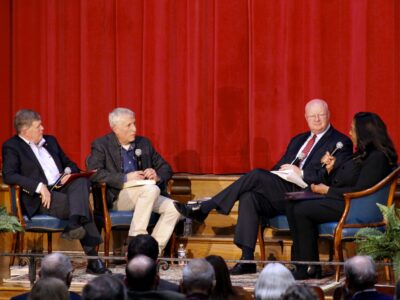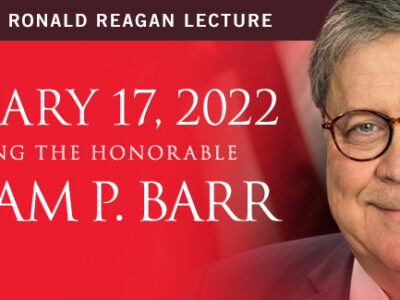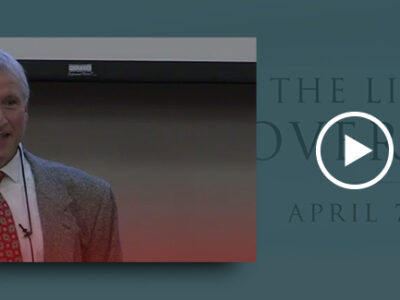Over the last week, I’ve been asked many questions about Ronald Reagan’s faith. A particularly interesting exchange took place this morning. I told a radio talk-show host that Reagan’s faith was fundamental to nearly everything he did in the Cold War. “Everything?” responded the host. “Surely not everything. Did his faith inspire him to call on Mikhail Gorbachev to tear down the Berlin Wall?”
Actually, yes. The words, of course, were speechwriter Peter Robinson’s, though Robinson is quick to note that he chose words that matched Reagan’s sentiments. And those words remained because Reagan refused to let the wise men remove them.
Reagan’s challenge to Gorbachev, as well as his desire to bring down that wall, was rooted in what he called “practical Christianity,” which he learned as a child from his mother, Nelle Reagan, and from a 1903 book titled That Printer of Udell’s. Reagan read the book in 1922, but would cite it throughout his life as the book that impacted him most. The book taught Reagan that there is good and evil and right and wrong, and that a real Christian—a practical Christian—has a moral responsibility to denounce evil.
A direct line can be drawn from 1922 to March 8, 1983, when Reagan told the National Association of Evangelicals: “There is sin and evil in the world, and we are enjoined by Scripture and the Lord Jesus to oppose it with all our might.” That is why he called the USSR an Evil Empire; it is also why he opposed that sinful, evil wall dividing East and West.
To be sure, Reagan had additional motivations with the Berlin Wall speech.
At the time, the view of sophisticated thinkers was that Mikhail Gorbachev could walk on water. If only that troglodyte Reagan would get out of the way, Gorbachev would part the sea. Well, on June 12, 1987, Reagan took this view to task: If Gorbachev was truly a reformer, figured Reagan, he should prove it by knocking down that barbarous wall. He issued a direct challenge to Gorbachev.
As I watched the challenge on my television screen, I cheered. And I also pondered a question: What were they watching on Moscow television? Over a decade later, with access to Soviet media archives, I got an answer: Viewers of the Moscow Television Service tuned in to a lengthy discussion of the speech by three of the nation’s top “political analysts”—Valentin Sorin, Georgi Arbatov, and Valentin Falin. The show was the “Studio 9” program. It was quite popular, boosted by both no competition and a monopoly on opinion.
Host Zorin began the show by lamenting that Reagan’s speech “was in the old spirit of the Cold War.” This reflected Moscow’s continual claim in the 1980s that there was no Cold War, only Reagan militaristic attempts to re-ignite one. For an objective assessment, Zorin turned to Arbatov.
Reagan’s wall call, explained Arbatov, was “plain blackmail, blackmail by an American cowboy … threatening and waving his hands and staging a show of strength near the Berlin wall.” He informed Soviet citizens that Reagan’s statement was merely an attempt to deflect Americans’ attention from the Iran-Contra scandal and the impending economic “crash” about to befall the capitalist United States.
Falin then chimed in, assailing Reagan’s “frantic demagoguery.” West Berlin didn’t need this speech, assured Falin. “West Berlin needs détente, an atmosphere of tranquility, and an absence of friction.” Reagan was yet again “increasing tension.”
Falin justified the Berlin Wall’s 1961 construction and continued existence: “The measures our GDR [East German] friends were forced to take in 1961 were of strictly defensive character…. [T]hose measures … steeply reduced possibilities of using West Berlin for subversive activities against the GDR and other socialist states. Today the President turns to the vocabulary of the forties, fifties, and sixties and tries to plunge West Berlin back at least 20 years.”
In fact, Falin believed that a divided Germany was imperative. Calling Berlin the “capital of bloody fascism,” he complained: “For Reagan the whole German question is the opening of the Brandenburg Gate. For all Europe and for us, however, it is the question of not allowing World War III to be unleashed again by German imperialism.”
Let there be no doubt: In June 1987 a unified Germany’s best friend sat in the Oval Office, not Studio 9.
Chomping at the bit, Arbatov jumped back in: “What Reagan is saying is simply political vulgarity. Political vulgarity.” Reagan, charged Arbatov, was “hampered by the old burdens, lack of desire to change; the old way of thinking is well embodied in this man.”
Moderator Zorin invited the commentators to address Reagan’s specific request that Gorbachev “prove” he was serious about “openness” by coming to Berlin to open the Brandenburg Gate.
Falin replied by bemoaning Reagan’s dirty pool: “I think that Reagan is not only imposing political rules of the game on the other countries and the Soviet Union, but he also wants the political figures and leaders of the states to think precisely the same way as he does. But the Soviet leaders do not come into the house of someone else to either close or open gates. Soviet leaders know and respect international laws, know and respect sovereign interests of other countries…”
He was cut off by Zorin: “Unlike the U.S. President.”
Yes, Falin shot back, “…unlike the U.S. President.”
To these three men, Reagan’s call to tear down the wall had nothing to do with liberating people. Poor East Germany had, after all, as Falin said in the most outrageous statement of that evening, erected the wall in 1961 for “strictly defensive” reasons.
The tragic truth is that the Berlin Wall was not erected to keep the enemy (the West) from invading, as walls historically have been intended, but to keep East German citizens from escaping. Here is a horrific fact: the East German guards at the wall faced East not West; that says it all.
This reminds us of what America was up against in the 1980s and why Reagan issued that challenge to Gorbachev. The president knew the difference between right and wrong; his faith informed that difference and the willingness to speak out. By not remaining silent, he made an impact.




